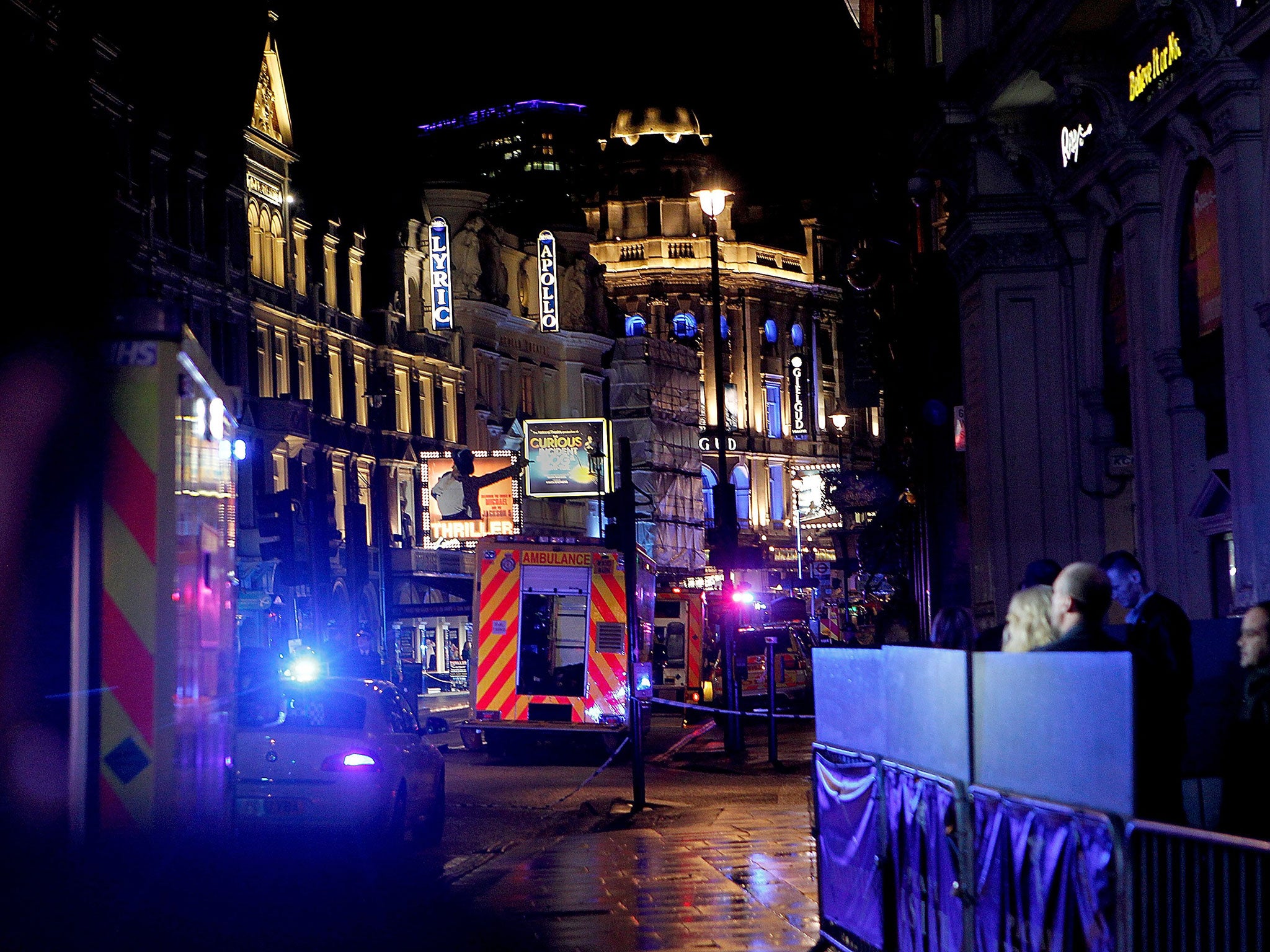Heavy rain and years of 'benign neglect' may have caused Apollo Theatre roof collapse
Owner of the playhouse had previously admitted that London’s theatre buildings had 'suffered years of benign neglect'

Investigators were on Friday trying to discover if heavy rainfall played a part in Thursday night’s ceiling collapse at Apollo Theatre which injured 79 people.
It emerged that the owner of the playhouse had previously admitted that London’s theatre buildings had “suffered years of benign neglect” and had poorly maintained roofs. The warning had come from Nica Burns, co-owner of Nimax which owns and operates the Apollo on Shaftesbury Avenue and five other theatres in central London.
The collapse at the 112-year-old venue sent 10 square metres of ornate plasterwork and masonry falling on the audience after reports suggested water had been dripping through cracks in the Grade II-listed theatre’s ceiling. There was heavy rain and thunder in the area earlier in the day, which may have weakened the structure.
Forecasters said there was an “abnormally high concentration of rain, hail and lightning strikes” on Thursday evening and almost 15 per cent of the average monthly rainfall for one area in December fell in a single hour.
London Ambulance Service confirmed that 79 people had been injured, of whom 56 were taken to hospital, nine with serious injuries. A spokesman for Nimax announced that an investigation was under way into what caused the “shocking and upsetting incident”.
According to Ms Burns’s previously reported comments, Nimax’s theatres have been particularly vulnerable to water ingress and poorly maintained roofs. She also said that a carved stone muse at the Apollo was a “muse of destruction” when the firm bought it in 2005, although it has since been repaired. Her comments were made last spring in a Theatres Trust publication as Nimax unveiled a £2.45m restoration programme for its six properties in the capital that saw the repair of gutters, rusting steel beams and stone copings.
On Friday despite repeated requests Nimax was unavailable to further comment or confirm to The Independent what work had been carried out on the Apollo as part of the programme. The Society of London Theatre has said it would cost between £5m and £10m to fully refurbish a venue of the Apollo’s size.
Witnesses described “chaos and panic” as parts of the roof “began to crumble” around them just after 8pm during a performance of the National Theatre’s production of Mark Haddon’s The Curious Incident Of The Dog In The Night-time. Historic theatres are required to undergo rigorous roof safety checks every three years and on Friday the leader of Westminster City Council, Philippa Roe, told The Independent: “As the investigation is ongoing, we are unable to comment further on specifics. However, we can say that the Apollo’s health and safety checks are up to date.”
She added: “Each historic theatre is unique and we have no reason to believe this is anything other than an isolated incident. We have confirmed that all theatres’ safety checks are up to date, however as a precaution, all historic theatres are carrying out further safety checks.”
A spokesman for the Society of London Theatre confirmed the West End was still “open for business”. They said: “On behalf of London’s theatre industry, our thoughts and sympathies go out to everyone who was injured and affected by Thursday’s incident.”
Close to final act: old venues in need of repair
The West End, which hosts more than 32,000 theatregoers nightly, is home to some of the world’s oldest venues.
As well as the Apollo, Nimax, which was formed in 2005 and has an annual turnover of £14m, owns and operates the Palace, Lyric, Garrick, Duchess and Vaudeville theatres in the capital, all of which were built between 1870 and 1929. In 2001 the Garrick basement flooded for a week when its Victorian-era drainage system failed.
Four of the venues were sold to Nimax by theatre impresario Andrew Lloyd Webber in 2005, who said he planned to use the revenue to spend £10m renovating his remaining theatre empire.
Alongside Nimax, Lord Lloyd Webber’s theatre company is the other major player in the capital, operating the Theatre Royal on Drury Lane, the New London, the Cambridge, the London Palladium, the Adelphi Theatres and Her Majesty’s Theatre.
According to the Theatres Trust’s at-risk register there are 48 playhouses in the UK in extreme disrepair or at risk of demolition, including the Derby and Dudley Hippodromes as well as the Brighton Hippodrome and the Alexandra Palace Theatre in Harringey, north London.